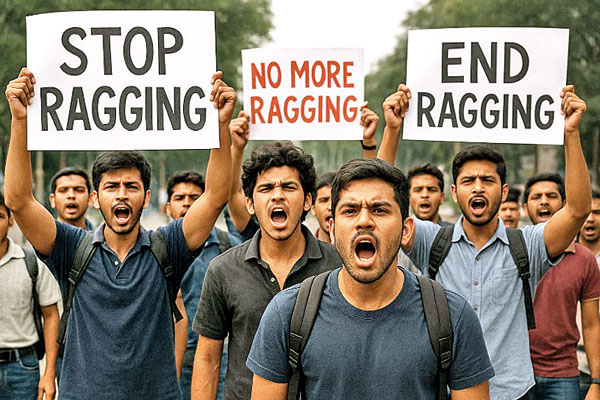Triggering Change: The Tragedy of Ragging and Sri Lanka’s Urgent Need for Reform
View(s):Opinion | Education & Society
On April 29, 2025, Charith Dilshan, a 23-year-old second-year engineering student at Sabaragamuwa University, died by suicide.
His death was not accidental. It was not random. It was the result of sustained humiliation and psychological torment — allegedly at the hands of senior students in the name of a so-called “tradition” known all too well in Sri Lankan universities: ragging. And now, we must ask ourselves the question we’ve asked too many times before: How many more lives must we lose before we put an end to this cruelty?

- Chathura Kotagama – Education Consultant
Ragging Is Not a Tradition — It Is Abuse
For too long, ragging has been defended under the guise of bonding, character-building, or cultural inheritance. But let us call it what it is: a system of control and abuse, perpetuated by power dynamics, normalised violence, and institutional apathy.
Though outlawed under the Prohibition of Ragging Act, No. 20 of 1998, enforcement has been dismal. University administrations continue to operate in damage-control mode, issuing statements only after tragedies occur. Committees are formed. Reports are written. But change remains elusive. Charith’s death is not an isolated incident. It is a manifestation of decades of neglect, cowardice, and inaction.
When Music Speaks the Truth: Stigmata’s “Trigger”
In the wake of this tragedy, a voice of protest emerged not from a podium, but from a speaker. Sri Lanka’s iconic progressive metal band Stigmata released their latest track, Trigger — a raw, unflinching reflection on the mental destruction caused by bullying and psychological violence.
“Turn wine into water, squeeze poison out of stone”
One line in particular feels devastatingly relevant. A reversal of miracles, this lyric becomes a metaphor for how something once sacred — like university life — is corrupted. Instead of nurturing young minds, the system drains them of vitality and replaces hope with harm. It’s a stark portrayal of how ragging and institutional neglect can degrade the most transformative years of a young person’s life.
The song isn’t just about bullying. It’s about every student silenced, cornered, and erased by cycles of emotional abuse and collective complicity.
Art has a way of doing what bureaucracy can’t — it connects, confronts, and compels. Trigger deserves to be heard widely, not just as a tribute to victims like Charith, but as a call to action for an entire nation.
We Need a Mental Health Revolution in Education
If this is to be the last such tragedy, then our response must go far beyond crisis meetings
and sympathy statements. Sri Lanka is in urgent need of systemic, embedded
psychological support across its education system.

We must:
Appoint licensed clinical psychologists at all state universities — not just “student Counsellors.”
Introduce psychological education into school curricula, from Grade 1 onwards.
Train teachers and administrators in trauma-informed practices, so they can recognise early signs of distress.
Launch national awareness campaigns to destigmatise mental health and promote empathy and emotional intelligence.
Because the greatest silence isn’t what comes after a suicide — it’s the silence before, when students cry for help in a language we haven’t taught ourselves to hear.
We Must Also Educate the Educated
The problem isn’t only among students. It runs deeper — into the very leadership of our
universities and ministries. Many senior administrators, deans, and policymakers fail to recognise the psychological toll ragging takes on young people. Some dismiss it. Others defend it.
We need to educate the educated. Mandatory, recurring training on student wellbeing,
psychological safety, and crisis prevention must become the norm — from vice chancellors to hostel wardens.
Because when those in charge lack emotional awareness, the system fails — and students pay the price.
Beyond the Campus: A Culture Addicted to Conformity
Let us not pretend that ragging is confined to campuses. It is a symptom of a deeper national condition: our obsession with mob mentality.
We see it everywhere — in politics, workplaces, even families. Independent thinking is punished. Dissent is mocked. Obedience is rewarded. And worst of all, abuse is often mistaken for discipline.
If Sri Lanka truly wishes to progress — socially, economically, morally — we must break this cycle. We must raise citizens who are empathetic, courageous, and principled. Not just compliant.
Let This Be the Last Time
Let Charith’s story be the last of its kind. Let Trigger be the soundtrack of a new era — one that replaces silence with speech, cruelty with care, and conformity with conscience.
If we truly care about our youth, then let us protect them — not punish them. If we care about education, then let it be a tool for transformation — not trauma. And if we care about this country, then we must act now. Because tomorrow is already too late.
Help is available.
If you or someone you know is experiencing emotional distress, contact the National Mental Health Helpline in 1926 or reach out to a qualified mental health professional in your area.
You are not alone. You are never alone.
Chathura Kotagama is a senior administrator in private higher education and an advocate for student wellbeing and systemic reform in Sri Lanka’s education sector. He writes on leadership, mental health, and education policy.
HitAd.lk is the best and biggest mobile phone market in Sri Lanka, and we guarantee you will find what you need here from our extensive listing of mobile phones for sale in Sri Lanka. Whether it’s a budget-priced smartphone for communication, or higher end features with advanced connectivity, there are many different options from which to choose from on our site!


